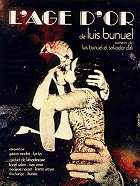Ohjaus:
Luis BuñuelKuvaus:
Albert DuvergerNäyttelijät:
Gaston Modot, Lya Lys, Max Ernst, Luis Buñuel, Paul Éluard, Claude Heymann, Jean Aurenche, Pierre Prévert, Jacques B. Brunius, Joaquín Roa (lisää)Juonikuvaukset(1)
Luis Bunuelin hämmentävä ensimmäinen pitkä elokuva, tekijänsä taiteellinen ja yhteiskunnallinen manifesti, joka hyökkää hullun rakkauden puolesta porvaristoa ja sovinnaisuutta vastaan. (YLE)
Arvostelut (3)
L'amour fou as the boldest motif of a film that is otherwise intentionally “broken” and devoid of narrative points of reference. Why waste time on the narrative when all you need to put the better society at unease are individual scenes and gags that seem to be taken from rather coarse slapstick? (I consider the kicking of the dog and the shooting of the boy, though gratuitously shocking, to be the peak of Buñuel’s feats of anarchy). Buñuel also dealt with the obstacles that civilised society places in the path of natural human needs in his later work, but he gave them a more modest form and subtly hid the phallic symbolism beneath the surface, whereas here he puts it front and centre with obsessive thoughts of sex. As his method he adopted entomological observation, with which The Golden Age begins. He limited direct interventions in the image and held back with the visual assaults (Un Chien Andalou begins with one such unforgettable assault) in favour of more subversive provocations such as bending genre rules, concealing what’s essential and exaggerating what’s marginal. Still, I wouldn’t condemn The Golden Age as the cold class (and generational) rebellion of a once hot-blooded Spaniard. No one has yet shot a more accurate scene about the fetishisation of the human body. 75%
()
No wonder the Age of Gold caused quite a stir back in its day. The maker of the (slightly more) twisted Un Chien Andalou was inspired by the warped mind of the Marquis de Sade and made a film that is certainly worth seeing, even if it won't appeal to everyone (I was only half convinced). The central couple could not have been more unlikeable, while the interaction between the Man and the Woman was – willy-nilly – a sure source of humour. The final scene with the degenerate like "120 Days of Sodom" with "Jesus" was inserted into the film perhaps a little too forcefully. A kind of foreshadowing of the later Pasolini.
()
Luis Buñuel showcases the power of direction that has helped shape and transform it for the film. This is no longer just associative rambling, but this is already a film with a story, even though it may be difficult for you to find. However, the symbols that are here certainly are not denied and it works well. It has an effect on you, it does something to you, whether it's a cow in bed or a sinner in the form of Jesus.
()

